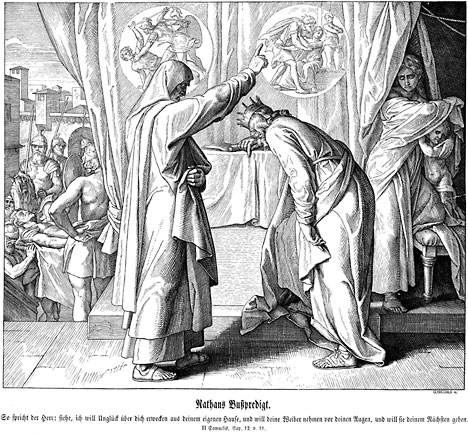Prophecy and Ethics
 “The apocalyptists said, The world is coming to an end: Give up! The Biblical prophets said, The world is coming to a beginning: Get to work!”
“The apocalyptists said, The world is coming to an end: Give up! The Biblical prophets said, The world is coming to a beginning: Get to work!”
Is it only me that has to restrain himself from violence when someone refers to the Revelation as “Apocalyptic”? I guess using a long word derived from Greek is a handy way of disguising the fact that you have little idea of what’s actually going on in the book.
In Paradise Restored: A Biblical Theology of Dominion, David Chilton writes:
The Book of Revelation is often treated as an example of the “apocalyptic” genre of writings which flourished among the Jews between 200 B.C. and A.D. 100. There is no basis for this opinion whatsoever, and it is unfortunate that the word apocalyptic is used at all to describe this literature. (The writers of “apocalyptic” themselves never used the term in this sense; rather, scholars have stolen the term from John, who called his book “The Apocalypse [Revelation] of Jesus Christ.”) There are, in fact, many major differences between the “apocalyptic” writings and the Book of Revelation.
The “apocalyptists” expressed themselves in unexplained and unintelligible symbols, and generally had no intention of making themselves really understood. Their writings abound in pessimism: no real progress is possible, nor will there be any victory for God and His people in history. We cannot even see God acting in history. All we know is that the world is getting worse and worse. The best we can do is hope for the End – soon. But for now, the forces of evil are in control. (Sound familiar?) The practical result was that the apocalyptists rarely concerned themselves with ethical behavior. They weren’t much interested in how to live in the present (and actually taking dominion would be unthinkable); they just wanted to speculate about the coming cataclysms.
John’s approach in the Revelation is vastly different. His symbols are not obscure ravings hatched from a fevered imagination; they are rooted firmly in the Old Testament (and the reason for their seeming obscurity is that very fact: we have trouble understanding them only because we don’t know our Bibles). In contrast to the apocalyptists, who had given up on history, John presents history as the scene of redemption: God saves His people in their environment, not out of it; and He saves the environment.
Leon Morris, in his important study of Apocalyptic (Eerdmans, 1972), describes John’s worldview: “For him history is the sphere in which God has wrought out redemption. The really critical thing in the history of mankind has already taken place, and it took place here, on this earth, in the affairs of men. The Lamb ‘as it had been slain’ dominates the entire book. John sees Christ as victorious and as having won the victory through His death, an event in history. His people share in His triumph, but they have conquered Satan ‘by the blood of the Lamb and by the word of their testimony’ (Rev. 12:11). The pessimism which defers God’s saving activity until the End is absent. Though John depicts evil realistically, his book is fundamentally optimistic” (p. 79).
The apocalyptists said, The world is coming to an end: Give up! The Biblical prophets said, The world is coming to a beginning: Get to work!
Thus, the Book of Revelation is not an apocalyptic tract; it is, instead, as John himself reminds us repeatedly, a prophecy (1:3; 10:11; 22:7, 10, 18-19), completely in keeping with the writings of the other Biblical prophets. And — again in stark contrast to the apocalyptists — if there was one major concern among the Biblical prophets, it was ethical conduct. No Biblical writer ever revealed the future merely for the sake of satisfying curiosity: the goal was always to direct God’s people toward right action in the present. The overwhelming majority of Biblical prophecy had nothing to do with the common misconception of “prophecy” as foretelling the future. The prophets told of the future in order to stimulate godly living. The purpose of prophecy is ethical.


























May 1st, 2012 at 10:26 pm
Normally, I appreciate Chilton for his typological insight, but here he is just plain wrong. There IS a genre called apocalyptic literature, and while John’s Revelation may explode the parameters of the genre, it is nevertheless squarely in it. Mixing metaphor, kaleidoscopic jumble of pictures, numerology, chiasms, etc. are all hallmarks of the genre, which John has in common with sections of Joel, Isaiah, Daniel, Ezekiel and the apocryphal books of the “Apocalypse of … Abraham, Adam, Baruch, etc.” It IS an established genre and it is more helpful than not to place Revelation in it. Most kids today call it SciFi!!!
May 1st, 2012 at 10:35 pm
Robert – I don’t think he’s trying to prove that they don’t look similar on the surface. Bathrooms and justice both have scales. He’s peeled off the skin to describe the underlying character and purpose. So it’s not so much exploding the genre classification as exposing it as superficial.
Related to sci-fi, you could say that the Biblical prophecies were all written by the master, and the Jewish “spin-offs” were cheap look-alikes trying to jump on the bandwagon. Like the Book of Mormon being written in King James English!